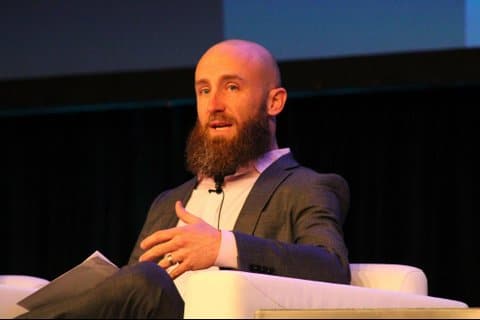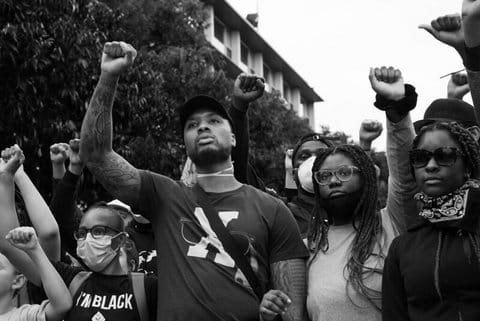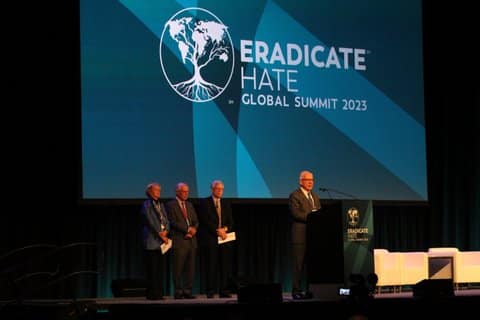
22 Jan Task Force Uses Soldiers to Put a Dent in Hate-Fueled Extremism

Task Force Butler founder Kristofer Goldsmith speaks at the Eradicate Hate Global Summit about how his military experience led him to form an anti-hate institution. (Joe Porrello / The CC Pulse)
Editor’s note: The Eradicate Hate Global Summit began in 2021 in response to the mass shooting at the Tree of Life synagogue. This year, The CC Pulse was there for the first time in service of our Stop the Hate coverage. This is one of many stories we will publish that is about or inspired by the summit.
By Joe Porrello
PITTSBURGH — Kristofer Goldsmith was on the brink of joining an extremist group after being kicked out of the Army at 21. Now, he’s fighting the hate that almost overcame him.
After Goldsmith graduated from college and later got laid off during the pandemic, a friend in California whom he served with asked him for help taking down a neo-Nazi group — beginning Goldsmith’s fight against hate.
That led him to start Task Force Butler, in which veterans like him slow down hate-fueled extremism in the U.S., one militia at a time.
Goldsmith sat on a panel with four other anti-hate activists at the Eradicate Hate Global Summit during September in Pittsburgh to discuss how the most active extremist groups recruit members and incite violence..
According to the National Institute of Justice, domestic hate groups are growing in activity level and sophistication. NBC News reported in 2012 that the number of U.S. militia groups had grown from 149 to 1,200 since 2008.
About a decade later, overall hate group participation had slightly declined in 2021, but Proud Boys membership surged after a public endorsement from then-President Donald Trump telling the group to “stand down and stand by.”
It’s groups like the Proud Boys that TFB is trying to deter.
Partly named after a U.S. military crew that took down Nazi defenses after D-Day, Task Force Butler is specifically trying to deter hate online and in person of any groups attempting to prey on religious, sexual and racial/ethnic minorities.
Such groups often claim the right to free speech to defend their hateful words, but Goldsmith won’t let them get off that easy.
“You have a First Amendment right to be an extremist, and I have a right to make that difficult and expensive,” he said.
The task force is also named after Marine Corps Gen. Smedley Butler, who had a similar sentiment to Goldsmith when it came to hate groups almost a century ago.
“My interest is, my one hobby is, maintaining a democracy. If you get these 500,000 soldiers advocating anything smelling of fascism, I’m going to get 500,000 more and lick the hell out of you,” Butler said in 1934, according to the task force’s website.
Also according to the website, TFB’s goal is to not to cause people in hate groups harm but to help them leave a path that only leads to their downfall.
In its first year, it negatively impacted neo-Nazi groups such as Patriot Front, NSC-13 and Aryan Freedom Network by contributing research in three lawsuits and unmasking over 60 white supremacists.
Part of the task force’s strategy is training journalists and the community through the TFB Institute to keep them safe and give them the skills needed when either reporting on or living near hate group activity.
TFB identifies itself as a nonpartisan, pro-democracy initiative that gives people the opportunity to reclaim the meaning of “patriotism” by fighting extremist groups within the bounds of the law — where, it says, the government has failed to do so.
Goldsmith said when he got home from the Army, he was angry and was primed to be receptive to messages from hate groups.
“I was pretty messed up,” he said. “Even amidst the pain and PTSD, I was looking for purpose, community and a way to save my country from self-harm.”
“I came this close to being one of the people we now track.”
Goldsmith says that while the military conditions its members to rely on a group, it also gives those who serve a sense of self-reliance. He thinks this might contribute to veterans joining hate groups.
“I believed any adversity I faced, I could just tough it out, and that was not the truth…I was in desperate need of help,” he told the Pulse. “When I lost the military, I lost my team, my support network, my community.”
While the task force focuses on militias, Middlebury Institute Director and panelist Matt Kriner said focusing on individuals who commit hate crimes — such as the mass shootings in Buffalo and Pittsburgh — is also crucial.
“We’re failing ourselves if we try to say everything is the same as before and groups are the only baseline,” he said.
Kriner said hate groups leverage broad preexisting narratives, enabling them to motivate people to join extremist militias. He said understanding the historical context of specific motivations for different hate groups is instrumental in combating them.
“Society as a whole is experiencing some pretty severe questioning of the values of democracy,” he said.
Goldsmith said many people become disillusioned with how politics work, and veterans feel that some voters do not care about sending people to war.
“The average voter doesn’t walk around wondering what troops are putting their lives on the line for today,” he told the Pulse. “For me, that built a sense of resentment.”
When the U.S. government started the Iraq War, Goldsmith felt it was a choice rooted in lies.
“I had a real visceral reason to be mad, not just at the government but at American people,” he told the Pulse. “It was a war permanently disabling my friends and killing people that I worked with.”
Some leaders took advantage of that lost faith in government — like disgraced former Lieutenant General of the U.S. Army Mike Flynn, who also served as Trump’s national security advisor.
According to Goldsmith, Flynn radicalizes and recruits American soldiers and veterans for an “impending civil war,” and uses his military identity to bring credibility to conspiracy theories.
When soldiers leave the military, they need to form a new identity. They can be left confused and desperate for camaraderie, which hate groups use to their advantage. Goldsmith says this is something the military has in common with other aspects of society. It can happen to young people as they leave high school, for example.
After graduating from high school himself and not immediately pursuing a degree, Goldsmith told the Pulse his identity became the townie who was not good enough. He said seeing his buddies go off to college while he went to war also made him bitter.
He says the military is not radicalizing people, but it is creating friction points: “like being with your friends instead of laying out in a field in the mud shooting guns and having to clean rusty weapons…You are a product of your experiences, on the micro and macro level.”
Goldsmith said he felt resentful toward people his age who didn’t serve because he felt they had it easy and felt alienated from those around him.
Panelist Arie Perliger from the School of Criminology and Justice Studies at University of Massachusetts, Lowell, said it’s important — especially for law enforcement — to understand the nuances of hate groups and not believe they all share one ideology.
Using catchphrases to talk about violent extremism because it’s easier than looking at data is something Perliger said helps nobody.
“I think we feel better when we can really simplify a very complex phenomenon,” he said.
Some believe naming, shaming or talking about hate group members can glorify them and lead to recruitment rising, as well as denying the individual an exit strategy.
Goldsmith disagrees, highlighting how publicity about a Blood Tribe training ground led to one state senator in Maine coming up with a bill that would “ban any militia training grounds that cause civil disorder, regardless of party or ideology.” He also told the Pulse he hopes TFB documenting neo-Nazi members — thus making it difficult for them to find jobs and housing — provides a disincentive to potential extremists.
Goldsmith says primetime news figures glorifying insurrections and undermining the idea of diversity adds to extremist recruitment.
“I definitely flirted with some conspiracy theories; I mean, Glenn Beck was on Fox News then,” he told the Pulse.
Searching videos from controversial conservative figures like Beck and Alex Jones caused YouTube’s algorithm to feed Goldsmith channels peddling antisemitic ideas, furthering his interest in joining a hate group.
>>>Read: Visual Disinformation Can Be Especially Persuasive, Expert Warns
“I had all the prerequisites to become a dangerous person,” he told the Pulse.
Goldsmith’s turn away from that partly began when he met a woman of opposing political beliefs who had her own experiences with war, fleeing to the U.S. from Iraq through multiple countries during Operation Desert Storm.
“The trauma brought us together. The shared suffering brought us together,” he told the Pulse.
The relationship gave Goldsmith perspective on what was becoming what he described as his own radicalization and attraction to far-right wing ideologies.
>>>Read: Unexpected Friendship Illustrates Power of Personal Connection in Stopping Hate
As hate groups try using violence or the threat of it to achieve political goals, some are being kicked off of internet sites completely.
“The casual racism, the jokes, it starts there,” Goldsmith told the Pulse. “If they take that stuff into the real world, there are real-world consequences.”
With the First Amendment in mind, Michigan State associate professor and panelist Ryan Scrivens said hate groups should not be allowed on major platforms but will always operate on fringe sites.
“Regardless if we take down platforms, different ones are going to continue to emerge, but I think we need to do our best to contain the content,” he said.
Researchers at the Anti-Defamation League, including panelist Ben Popp, track online propaganda and other extremist militia activity.
ADL puts out an annual “Murder and Extremism Report,” detailing what hate groups are doing in terms of violence.
Popp pointed to its data showing right-wing extremism and white supremacy as leading ideologies that have been inspiring acts of political violence over the last several years. He said ADL tracked 25 right-wing militia-related murders in 2022.
Perliger said hate crime data and research overall needs to be improved for accuracy to create more positive change. Kriner said the best way to do this is by making the pool of data collectors and researchers as diverse as possible to limit potential inherent bias.
According to Kriner, violent extremism is not a problem we can arrest our way out of.
“We have a lot to work on, and there’s no easy solution,” he said. “We can’t just ban ideas.”
Task Force Butler is trying to be at least part of the remedy to hate, but as a nonprofit, it needs help with funding to do as much as it would like. Though, Goldsmith noted his organization has made an impact while just barely getting by financially.
“We are a small, scrappy organization with two members of staff,” Goldsmith told the Pulse. “We need to be able to manage volunteers, and that takes staff.”
Goldsmith pointed out that most people working with TFB have been affected by hate groups.
“Almost all of our staff and volunteers have lost somebody to the radicalization pipeline,” he said. “Not every (soldier) at Task Force Butler has gotten as close to the flames as I did.”
Those who volunteer work remotely throughout the U.S. and for their own safety remain anonymous to the public.
“I had a Nazi show up at my mother’s house less than a year ago,” Goldsmith told the Pulse, adding he has had three run-ins with SWAT teams over the past year because of fake emergency phone calls made to his address.
Lauren Katzenberg, Goldsmith’s wife, is an editor at the New York Times. Goldsmith said Katzenberg being a Jewish journalist makes her “a target (of hate groups) whether I do this or not.”
To shield his family and others from violent extremism, Goldsmith said the resistance must be professionalized, persistent, overwhelming, and have effective leadership.
In 2024, TFB plans to ramp up its activity by contributing to multiple RICO cases on hate militias to help lessen their effectiveness. RICO is the Racketeer Influenced and Corrupt Organizations Act.
This resource is supported in whole or in part by funding provided by the State of California, administered by the California State Library in partnership with the California Department of Social Services and the California Commission on Asian and Pacific Islander American Affairs as part of the Stop the Hate program. To report a hate incident or hate crime and get support, go to CA vs Hate.






No Comments